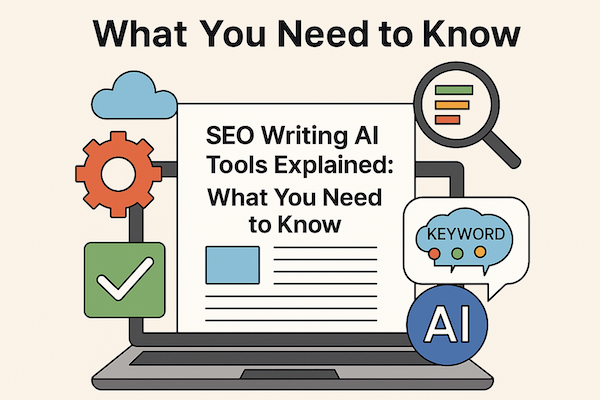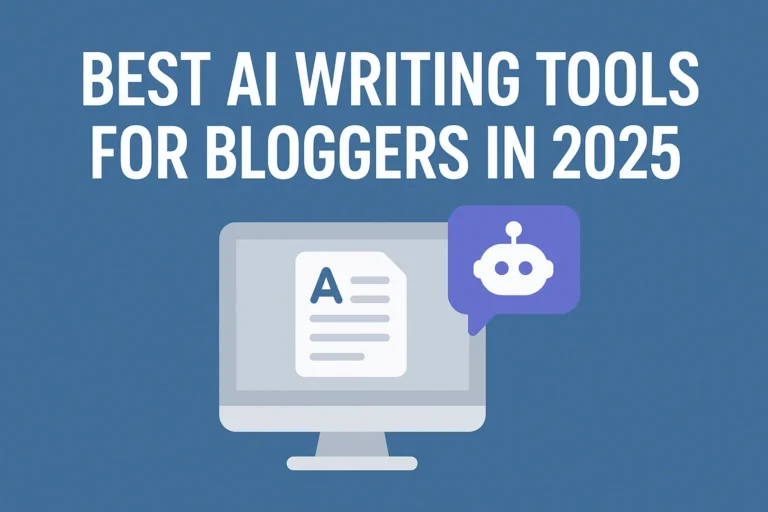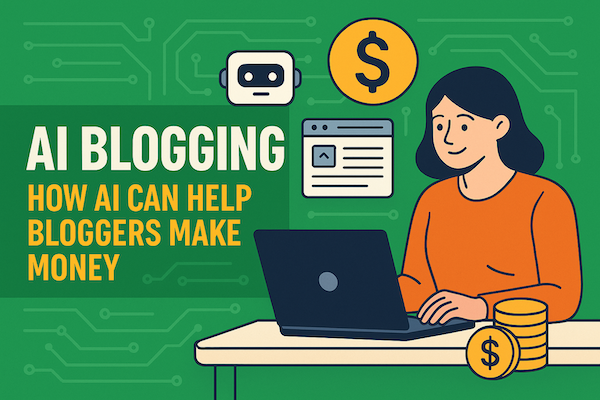AI for Bloggers:How to Use It Safely and Effectively in 2025
On This Page
ToggleWe use affiliate links. If you purchase something using one of these links, we may receive compensation or commission.

Introduction
AI for bloggers tools are no longer a futuristic concept — in 2025, they’re part of everyday blogging. From generating headlines to helping with SEO, artificial intelligence promises to make content creation faster and easier than ever. But along with the excitement comes a healthy dose of worry.
Bloggers are asking:
Is my data safe when I put it into tools like ChatGPT?
What about copyright — do I really own AI-generated text or images?
These are smart questions, and the truth is simple: AI can be a powerful assistant, but only if you use it wisely. When handled carelessly, it can create problems for your blog’s traffic, your reputation, or even your security.
That’s exactly what this guide is about. In the next sections, you’ll learn:
Why so many bloggers are turning to AI in 2025.
The main risks you should watch out for.
Safe, practical ways to integrate AI into your writing routine.
The tools worth trying — and how to avoid common mistakes.
By the end, you’ll know how to use AI as a helpful sidekick without losing your voice, your rankings, or your peace of mind.
💡 Want a simple way to stay safe and productive with AI?
Grab my free **AI for Bloggers Quick-Action Checklist (2025)** — a one-page PDF with the key steps you need to avoid mistakes and get results.
Why Bloggers Are Turning to AI in 2025
It’s no secret that blogging takes time — researching, outlining, writing, editing, optimizing for SEO, finding images, and then promoting the post. For many solo bloggers or small teams, it feels like running a one-person newsroom. That’s where AI for bloggers comes in.
Here are the main reasons bloggers in 2025 are embracing AI tools:
1. Faster Writing and Drafting
AI for bloggers often starts with writing. These tools can generate outlines, suggest headlines, or even create first drafts in minutes. Instead of staring at a blank page, you can start with an AI-generated structure and focus on adding your personal insights.
2. Repurposing Content Across Platforms
One blog post can become a week’s worth of content with AI. Many creators now use AI for bloggers to transform a single article into social media posts, email newsletters, or even scripts for YouTube videos — all in a consistent voice.
For creators working beyond text, this also includes AI tools for content creators that support audio, visual media, content repurposing, and publishing workflows.
3. Smarter SEO Research
AI-powered SEO tools analyze keywords, competitors, and search intent faster than traditional methods. Using AI for bloggers in SEO makes it easier to discover low-competition phrases or get suggestions for related topics, saving hours of manual research.
4. Visual Content Made Simple
AI isn’t just for writing. Bloggers can now generate custom images, infographics, or featured graphics without relying solely on stock photos. This makes AI for bloggers especially valuable for those who want unique visuals.
5. Editing and Proofing Support
From grammar checks to tone adjustments, AI writing assistants polish content before publishing. This ensures bloggers maintain professionalism even without a dedicated editor.
⚡ Bottom line: Bloggers are turning to AI because it saves time, boosts creativity, and keeps their workflow efficient. But while AI for bloggers is a powerful assistant, it also raises important safety and quality concerns — which we’ll cover in the next section.
The Safety Question: Is AI Risky for Bloggers?
Using AI for bloggers is exciting, but it comes with some important safety considerations. Not all AI tools are created equal, and knowing the potential risks can save you headaches down the road.
1. Data Privacy
Whenever you enter content into AI tools, you’re sharing information. Some platforms store inputs to improve their models, which could mean your drafts, research, or personal notes aren’t completely private. Choosing reputable tools with clear privacy policies is essential for bloggers who want to protect their ideas.
2. Google Penalties
Search engines like Google are constantly refining how they detect content quality. While AI can help create first drafts, publishing raw AI-generated text without edits can put your blog at risk of ranking penalties. Safe usage means treating AI as a helper — rewriting, fact-checking, and adding your unique voice.
3. Copyright Concerns
AI-generated text or images can raise copyright questions. Who owns the content? Can you legally use it commercially? Bloggers using AI should check licensing rules for both text and graphics to ensure they don’t accidentally infringe someone else’s work.
For a closer look at legal and ownership concerns, see my detailed guide on AI copyright risks, which explains how to avoid accidental infringement.
4. Fake or Biased Outputs
AI for bloggers isn’t perfect. It can produce outdated, inaccurate, or biased information. Always fact-check outputs before publishing, especially if your post includes statistics, advice, or claims that affect readers’ decisions.
⚡ Bottom line: AI for bloggers is a powerful tool, but only when used carefully. Understanding privacy, copyright, and content quality issues is the first step to using AI safely and effectively — the topic we’ll explore in the next section.
Safe & Smart Ways to Use AI as a Blogger
Using AI for bloggers can supercharge your workflow — but only if it’s done thoughtfully. Here are practical ways to leverage AI safely while keeping your content high-quality and original.
1. Outlining & Brainstorming
AI tools excel at generating structure. You can ask an AI to create a blog outline, suggest headings, or brainstorm topic ideas. The key is to treat these suggestions as a starting point — your own voice and perspective should shape the final content.
2. Drafting Content
AI can speed up first drafts, helping you overcome writer’s block or experiment with different angles. However, always rewrite and polish AI-generated text. This ensures originality, improves readability, and keeps your blog posts in line with SEO best practices.
3. Editing & Proofing
Grammar, spelling, and style checks are one of the safest ways to use AI for bloggers. Tools like Grammarly or AI editors can help you refine tone, improve clarity, and catch mistakes before publishing, without replacing your unique style.
4. SEO Optimization
AI-powered SEO tools can generate keyword suggestions, meta descriptions, or topic clusters. Use them to inform your strategy, but avoid stuffing keywords. Thoughtful placement, natural language, and user-friendly formatting remain crucial.
5. Images & Graphics
AI tools can generate visuals, infographics, or featured images. Make sure to use tools that provide proper licensing, and customize outputs to match your blog’s brand. This prevents copyright issues and ensures your content looks unique.
⚡ Pro tip: Always combine AI efficiency with human judgment. AI for bloggers works best as a supportive assistant, not a replacement for your creativity and expertise.
Tools Every Blogger Should Know (2025 Edition)
When using AI for bloggers, having the right tools can make all the difference. Here’s a curated list of the most helpful AI and productivity tools for 2025, covering writing, SEO, graphics, and workflow management.
1. AI Writing Tools
ChatGPT – Ideal for brainstorming, drafting, and rewriting content.
Jasper – Helps generate high-quality blog posts and marketing copy quickly.
Writesonic – Offers AI-generated content tailored for different platforms.
Copy.ai – Great for headlines, meta descriptions, and social media posts.
2. SEO Helpers
SurferSEO – Combines content analysis with keyword suggestions for top-ranking posts.
RankIQ – Offers AI-powered SEO recommendations for bloggers looking to boost organic traffic.
3. Graphics & Visuals
Canva AI – Simple tool for designing graphics, infographics, and featured images.
MidJourney – Advanced AI image generator for unique visuals.
4. Productivity & Workflow
Notion AI – Organize ideas, manage content calendars, and brainstorm topics efficiently.
Grammarly – Refines grammar, tone, and style across all your writing.
⚡ Bottom line: Using AI for bloggers effectively means pairing the right tools with human judgment. Each tool can save time, improve quality, and streamline your workflow — just remember to check licensing and data privacy before use.
What NOT to Do with AI (Beginner Mistakes)
While AI for bloggers can be a powerful ally, misusing it can backfire. Here are the top mistakes to avoid:
1. Don’t Copy & Paste Raw AI Content
Publishing AI-generated text without rewriting or adding your voice can hurt SEO and make your content seem generic. Google values originality, so always personalize and polish AI drafts.
2. Don’t Skip Fact-Checking
AI tools sometimes produce outdated, inaccurate, or biased information. Always verify statistics, quotes, and claims before publishing.
3. Don’t Over-Optimize for SEO
Stuffing keywords into AI-generated content may reduce readability and trigger search engine penalties. Use AI to suggest keywords, but focus on natural, user-friendly language.
4. Don’t Upload Sensitive Information
Avoid putting private, confidential, or personal content into AI tools that store data. Your drafts and research could be saved or analyzed by the platform.
5. Don’t Ignore Licensing for AI Images
Using AI-generated visuals without checking licensing can lead to copyright issues. Make sure the tools provide proper usage rights, especially for commercial content.
⚡ Bottom line: AI for bloggers is safe and effective only when used responsibly. Avoid these common mistakes, combine AI efficiency with human oversight, and your blog will stay secure, credible, and high-quality.
AI + Human Creativity = Best Results
The most successful bloggers in 2025 don’t rely on AI alone — they combine AI for bloggers with their own creativity and expertise. Think of AI as a helpful sidekick rather than a replacement for your skills.
1. AI as an Assistant, Not a Replacement
AI can generate ideas, drafts, and visuals, but it can’t replicate your unique voice, experiences, or storytelling. Use it to handle repetitive tasks, brainstorm faster, or polish your writing, while you maintain full control over the final content.
2. Highlight Your Unique Voice
Readers come to your blog for your perspective, insights, and personality. Infuse AI-generated drafts with your tone, anecdotes, and original examples. This not only keeps content engaging but also helps with SEO, as Google rewards authenticity.
3. Future-Proof Your Strategy
AI for bloggers will continue evolving. By learning to integrate AI thoughtfully today, you prepare for smarter tools in the future while keeping your content distinctive and valuable. Efficiency and creativity go hand in hand — AI speeds up your workflow, but human judgment ensures quality.
⚡ Bottom line: Combining AI with human creativity produces the best results. Use AI for speed and inspiration, but never sacrifice your originality — that’s what keeps readers coming back.
Conclusion: Using AI for Bloggers Safely in 2025
AI for bloggers is no longer optional in 2025 — it’s becoming an essential part of the blogging toolkit. From brainstorming to SEO research and image creation, AI can save you time and keep your content pipeline flowing. But as we’ve seen, it also comes with risks: privacy concerns, copyright questions, and the temptation to rely too heavily on machine-generated text.
The key is balance. Use AI as a supportive assistant, not as a replacement for your creativity. Add your personal stories, expertise, and voice to every post. That’s what keeps your blog authentic, future-proof, and valuable to readers.
✅ Quick recap:
-
Bloggers are turning to AI for speed, efficiency, and smarter workflows.
-
Safe usage means protecting your data, fact-checking outputs, and respecting copyright.
-
The best results come when AI efficiency is combined with human originality.
Similar Posts

Chat GPT Got New Memory? Personal Finding.
BysomeChat GPT new memory feature explained. Personal discovery on its impact, benefits, and how it enhances smarter AI conversations.

ChatGPT for Blogging Risks and How to Avoid Them
BysomeWe use affiliate links. If you purchase something using one of these links, we may receive compensation or commission. Using chatgpt for blogging can be a huge time-saver for content creators, but many bloggers worry about safety, accuracy, and Google penalties. The good news? You can use AI tools confidently if you understand the risks…

AI for SEO: Better Rankings With Less Effort
BysomeAI for SEO helps you rank faster and smarter. Discover the best tools, workflows, and common pitfalls to avoid in this practical 2025 guide.

SEO Writing AI Tools Explained: What You Need to Know
BysomeLearn what SEO Writing AI tools are, how they work, and how they help improve your content creation process. A must-read for smart content creators!

Best AI Writing Tools for Bloggers in 2025
BysomeDiscover the best AI writing tools for bloggers in 2025. Save time, boost SEO, and create better content with AI writing tools for bloggers.

AI Blogging: How AI Can Help Bloggers Make Money (2025)
BysomeDiscover how AI blogging boosts your income in 2025. Learn smart tools and strategies bloggers use to monetize and grow their sites with AI.
